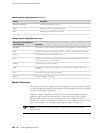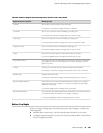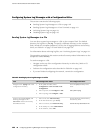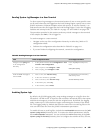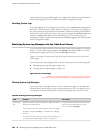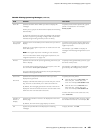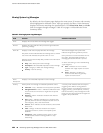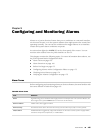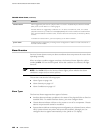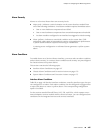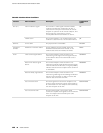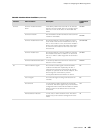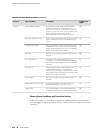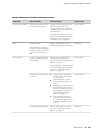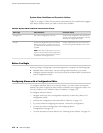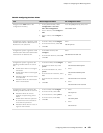
Table 88: Alarm Terms (continued)
DefinitionTerm
Alarm triggered by the state of a physical link on a fixed or installed Physical Interface Module
(PIM), such as a link failure or a missing signal.
Interface alarms are triggered by conditions on a T1 (DS1), Fast Ethernet, serial, or T3 (DS3)
physical interface or by conditions on the sp-0/0/0 adaptive services interface for stateful firewall
filter, Network Address Translation (NAT), intrusion detection service (IDS), or IP Security (IPSec)
services.
To enable an interface alarm, you must explicitly set an alarm condition.
interface alarm
Predefined alarm triggered by a missing rescue configuration or failure to install a license for a
licensed software feature.
system alarm
Alarm Overview
Services Router alarms warn you about conditions that can prevent the router from
operating normally.
When an alarm condition triggers an alarm, the Services Router lights the yellow
(amber) ALARM LED on the front panel. When the condition is corrected, the light
turns off.
NOTE: The ALARM LED on the Services Router lights yellow whether the alarm
condition is major (red) or minor (yellow).
This section contains the following topics:
■ Alarm Types on page 166
■ Alarm Severity on page 167
■ Alarm Conditions on page 167
Alarm Types
The Services Router supports three types of alarms:
■ Interface alarms indicate a problem in the state of the physical links on fixed or
installed PIMs. To enable interface alarms, you must configure them.
■ Chassis alarms indicate a failure on the router or one of its component. Chassis
alarms are preset and cannot be modified.
■ System alarms indicate a missing rescue configuration or software license, where
valid. System alarms are preset and cannot be modified, although you can
configure them to appear automatically in the J-Web or CLI display.
166 ■ Alarm Overview
J-series™ Services Router Administration Guide



